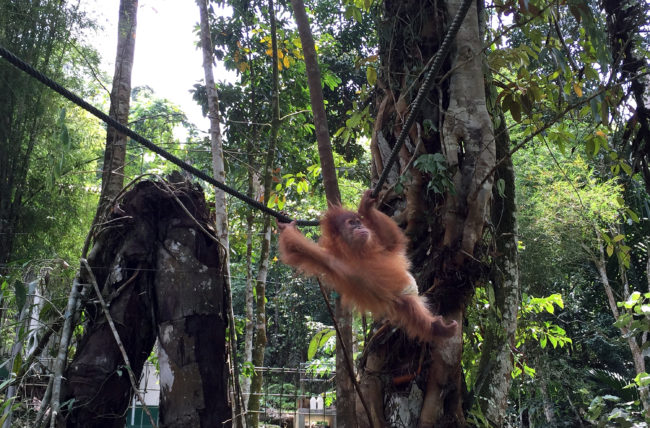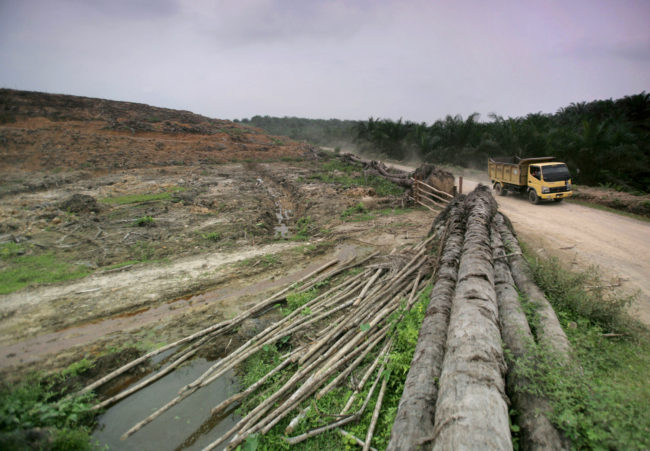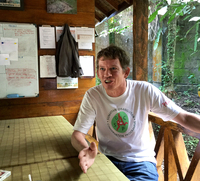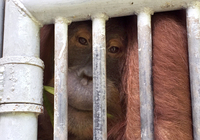
Anthony Kuhn/NPR
On a hillside on the Indonesian island of Sumatra, about 50 red-haired refugees are learning how to be orangutans once again. The country’s booming palm oil industry has encroached on their habitats, leaving many of them homeless and orphaned.
Palm oil is hard to avoid. It’s in cookies, soap, doughnuts and lipstick. It’s so common that it’s found in about half of all the items in an ordinary supermarket. As a result, it’s in high demand, and environmentalists blame it for deforestation, climate change, social conflict and animal extinction in Indonesia.
Sumatra’s orangutans are among the victims.
“The definition of a refugee is someone whose homeland is no longer available to them, and that’s exactly the case with these orangutans,” says Ian Singleton, director of the Sumatran Orangutan Conservation Program. “These are the survivors of this annihilation of the forest, and everything that lives in it.”
Environmental groups’ publicity about the plight of orangutans has helped to increase public pressure on the palm oil industry to stop destroying forests. But the primates are already endangered, with fewer than 7,000 believed to be surviving in the Sumatran wilds.

Chaideer Mahyuddin/AFP/Getty Images
The orangutan project, located about an hour’s drive outside Medan, the capital of Indonesia’s North Sumatra province, is set among lush foliage in the only forest land in the area that’s not palm oil plantation.
Singleton’s program rescues orangutans displaced by palm oil plantations, or whose families were killed so humans could keep them as illegal pets. Most of the orangutans are released back into the wild, but not all.
Take Leuser, a large adult male who cannot return to the forest because he is blind. He was rescued, taken to the center and then released back into the forest.

Anthony Kuhn/NPR
Then, he wandered too close to a village.
“Three farmers there carrying air rifles to shoot squirrels and monkeys found him and decided to take potshots at him as well,” Singleton says. “They put 62 air rifle pellets into him, including his eyes. He’s still got 48 inside him. But otherwise, he’s perfectly healthy and fit.”
A female named Tila plays nearby. Singleton, a former zookeeper in Britain, says she’s one of the saddest cases so far.
“She came here as a youngster, tested positive for … human hepatitis B, which means we can’t release her to the forest because there’s always a risk she’ll infect wild primates,” he says.
How did she contract the human disease? Almost certainly by biting the people who captured her, Singleton says.
The animals who make it to the conservation project are the lucky ones — and the tough ones.
“The orangutans that make it this far are the real survivors. Everybody else is dead,” he says. “The ones that get here are the ones that are hard to kill.”

Anthony Kuhn/NPR
When they first arrive, the orangutans are quarantined for 30 days and given thorough health checks. After they’re confirmed to be healthy, and before they’re released back into the wild, the orangutans spend time in “socialization” cages.
“This is where they really learn how to be an orangutan again,” Singleton explains, as young orangutans swing on ropes and open coconuts nearby. “They need to know how to protect their food, and fend off attack, and you find out who are the bullies and who are the wimps, so they’ve really got to figure out their place in orangutan society, and that happens here.”
Out in the wild, if an orangutan puckers up, kiss-like? It’s a sign of annoyance, he says, signaling unease.
Singleton is planning to build a haven for Leuser and Tila and other apes who can’t return to the wild. The haven will serve as an educational facility for visitors, including many Indonesians, who have never seen orangutans and know little about them.
Besides caring for these primates, Singleton also campaigns to stop illegal clearing of forests for palm oil. He’s fighting to protect an important part of the orangutans’ habitat, a 6.5 million acre swathe of Sumatra called the Leuser Ecosystem.
“It’s probably the biggest single contiguous forest bloc in the whole of Southeast Asia now,” he says. “And it’s the only place in the world where you get Sumatran orangutans, tigers and rhinos living together.”
On the positive side, in 2011, Indonesia’s president declared a moratorium on destroying primary forests and peat land.
But local officials in Aceh province on the northern tip of Sumatra have drafted a development plan that will dole out large swathes of the Leuser Ecosystem for mining, logging and palm oil plantations in violation of that moratorium. The matter is now before Indonesia’s Supreme Court.
Recently, major palm oil companies, under pressure from environmental groups and consumers, have issued pledges not to destroy forests in the making of their products.
But as permits to legally clear forest for palm oil become scarce, Singleton says, an unregulated layer of middlemen and local elites continues to do it illegally.
“Middle-class, well-connected people — the cousin of the police or the nephew of the governor — are just going into areas and clearing forests for palm oil without any permits, totally against the law,” he says.
For now, Sumatra still has enough forests into which Singleton can release his orangutan refugees. But if illegal deforestation continues, that could change.
“Where do you put them?” Singleton wonders. “You keep them alive, but at what cost?”
9(MDEwMjQ0ODM1MDEzNDk4MTEzNjU3NTRhYg004))
Transcript :
AUDIE CORNISH, HOST:
It’s hard to avoid palm oil. It’s in cookies, soap, doughnuts, lipstick – about half of the products in the regular supermarket. But as demand has grown for palm oil, the commercial cultivation of palm trees has impacted animal habitats. From the Indonesian island of Sumatra, NPR’s Anthony Kuhn reports on the orangutans that are refugees from the palm oil industry and one man’s quest to protect them.
ANTHONY KUHN, BYLINE: I’ve come to a patch of forest about an hour’s drive from Medan, the capital of North Sumatra province. I’m here to meet Dr. Ian Singleton, a former zookeeper from the U.K. He’s now director of the Sumatran Orangutan Conservation Program. The program takes in mostly orphaned orangutans and eventually releases them into the wild.
IAN SINGLETON: I’ll take you up and show you the – what we call the isolation cages, which is where orangutans have to spend a minimum 30-day quarantine when they first arrive, so masks on. We’re just going to dowse our boots and wash our hands before we proceed up the hill.
KUHN: Singleton keeps his apes at a distance from people and from each other, too – at least until he’s sure they’re healthy.
We’re heading up the hillside towards the quarantine. There’s some fenced-off areas and some houses, and beyond that is forest. Ian, tell me about the forest, you know, on this part of the island. What’s it like?
SINGLETON: We’re in an agroforest area. The road from Medan to here is kind of the only road out of Medan that’s not palm oil as far as you can see.
KUHN: Singleton says his orangutans are refugees. Their parents were killed; their forest homes were destroyed to make room for palm oil plantations. Most of the orangutans Dr. Singleton rescues will go back to the forest, but not all. Near the quarantine, Dr. Singleton introduces us to a large male orangutan named Leuser. He can’t go back to the forest because he’s blind.
SINGLETON: He wandered too close to a village at the edge of the forest, and three farmers there carrying air rifles to shoot squirrels and monkeys and found him and decided to take potshots at him as well. So they put 62 air rifle pellets into him, including in his eyes. He’s still got 48 inside him, but otherwise he’s perfectly healthy and fit.
KUHN: Another one who can’t go back is a female named Tila.
SINGLETON: She came here as a youngster, tested positive for hepatitis. We checked it. It was human hepatitis B, which means we can’t release her to the forest because there’s always a risk that she’ll infect wild primates.
KUHN: How might Tila have contract hepatitis, human hepatitis?
SINGLETON: Biting the guys who kept her, almost certainly. Yeah.
KUHN: Many orangutans were kept by humans as illegal pets. Singleton says these animals at his program are the lucky ones, and the tough ones.
SINGLETON: You know, the orangutans that make it this far are the real survivors. I mean, everybody else is dead. I mean, the ones that get here are the ones that are hard to kill.
KUHN: After they’re healthy, the orangutans are taught how to get along with members of their own species. These young ones are swinging on ropes and eating coconuts.
SINGLETON: This is where they really learn how to be an orangutan again. You know, they need to know how to protect their food, and fend off attack, and you find out who are the bullies, and who are the wimps. So they’ve really got to figure out their place in orangutan society, and that happens here.
KUHN: They pucker up their lips and sort of kiss, right?
SINGLETON: Yes.
KUHN: Any particular significance to any of those?
SINGLETON: Yeah, (pucker), like that. That’s a sign of kind of annoyance. I mean, if you see a wild orangutan in the forest, that’s not used to people, and they see you, they’ll immediately do that. I don’t say the word fear, but it means kind of uneasy.
KUHN: Besides caring for these primates, Dr. Singleton also campaigns to stop illegal clearing of forests for palm oil. He’s fighting to protect an important part of the orangutan’s habitat, a 6.4 million acre swath of Sumatra called the Leuser ecosystem.
SINGLETON: It’s probably the biggest single contiguous forest block in all of Southeast Asia now, and it’s the only place in the world where you get Sumatran orangutans, elephants, tigers, and rhinos living together.
KUHN: Singleton says his work is getting harder in that there are fewer forests left to take the orangutans he rescues. It’s getting easier in that pressure is growing on palm oil producers not to destroy forests. So finally I asked Dr. Singleton, should consumers boycott palm oil?
SINGLETON: Personally, I think we should be supporting more sustainable production. But as an individual, do whatever makes you feel happiest. You only get one chance on this planet, you know.
KUHN: Anthony Kuhn, NPR News, Medan. Transcript provided by NPR, Copyright NPR.
9(MDEwMjQ0ODM1MDEzNDk4MTEzNjU3NTRhYg004))
